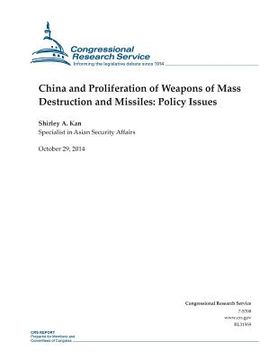China and Proliferation of Weapons of Mass Destruction and Missiles: Policy Issues (in English)
Synopsis "China and Proliferation of Weapons of Mass Destruction and Missiles: Policy Issues (in English)"
Congress has long been concerned about whether policy advances the U.S. interest in reducing the role of the People's Republic of China (PRC) in the proliferation of weapons of mass destruction (WMD) and missiles that could deliver them. Recipients of PRC technology included Pakistan, North Korea, and Iran. This CRS Report, updated through the 113th Congress, discusses the security problem of China's role in weapons proliferation and issues related to the U.S. policy response since the mid-1990s. China has taken some steps to mollify U.S. and other foreign concerns about its role in weapons proliferation. Nonetheless, supplies from China have aggravated trends that result in ambiguous technical aid, more indigenous capabilities, longer-range missiles, and secondary (retransferred) proliferation. Unclassified intelligence reports told Congress that China was a "key supplier" of technology, particularly with PRC entities providing nuclear and missile-related technology to Pakistan and missile-related technology to Iran. Policy approaches in seeking PRC cooperation have concerned summits, sanctions, and satellite exports. PRC proliferation activities have continued to raise questions about China's commitment to nonproliferation and the need for U.S. sanctions. The United States has imposed sanctions on various PRC "entities" (including state-owned entities) for troublesome transfers related to missiles and chemical weapons to Pakistan, Iran, or perhaps another country, including repeated sanctions on some "serial proliferators." Since 2009, the Obama Administration has imposed sanctions on 17 occasions on numerous entities in China for weapons proliferation. By 2014, the Administration started to negotiate a renewal of the U.S.-PRC nuclear cooperation agreement. Skeptics question whether China's roles in weapons nonproliferation warrant a closer relationship with China, even as sanctions were required on some PRC technology transfers. Some criticize the imposition of U.S. sanctions targeting PRC "entities" but not the government. Others doubt the effectiveness of any stress on sanctions over diplomacy or a comprehensive strategy. Concerns grew that China expanded nuclear cooperation with Pakistan, supported North Korea, and could undermine sanctions against Iran (including in the oil/gas energy sector). In 2002-2008, the U.S. approach relied on China's influence on North Korea to dismantle its nuclear weapons. Beijing hosted the Six-Party Talks (last held in December 2008) with limited results. Since 2006, China's balanced approach has evolved to vote for some U.N. Security Council (UNSC) sanctions against missile or nuclear proliferation in North Korea and Iran. Some called for engaging more with Beijing to use its leverage against Pyongyang and Tehran. However, North Korea's nuclear tests in 2006, 2009, and 2013 prompted greater debate about how to change China's calculus and the value of its cooperation. After negotiations, the PRC voted in June 2009 for UNSC Resolution 1874 to expand sanctions imposed under Resolution 1718 in 2006 against North Korea. The PRC voted in June 2010 for UNSC Resolution 1929 for the fourth set of sanctions against Iran. In 2013, the PRC voted for UNSC Resolutions 2087 and 2094 on North Korea for missile and nuclear tests. Still, China has continued its balanced approach that includes incremental implementation of UNSC sanctions. China's approach has not shown fundamental changes toward Pakistan, Iran, and North Korea.

